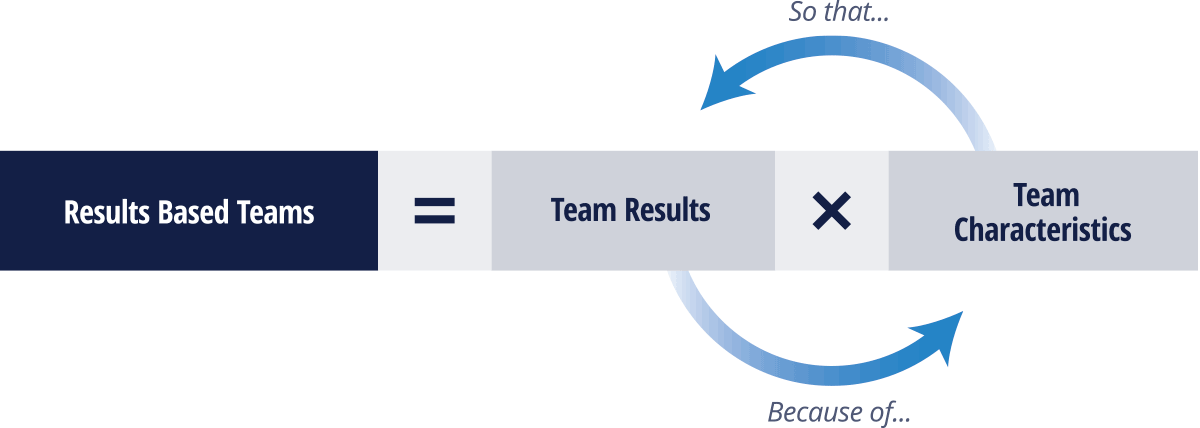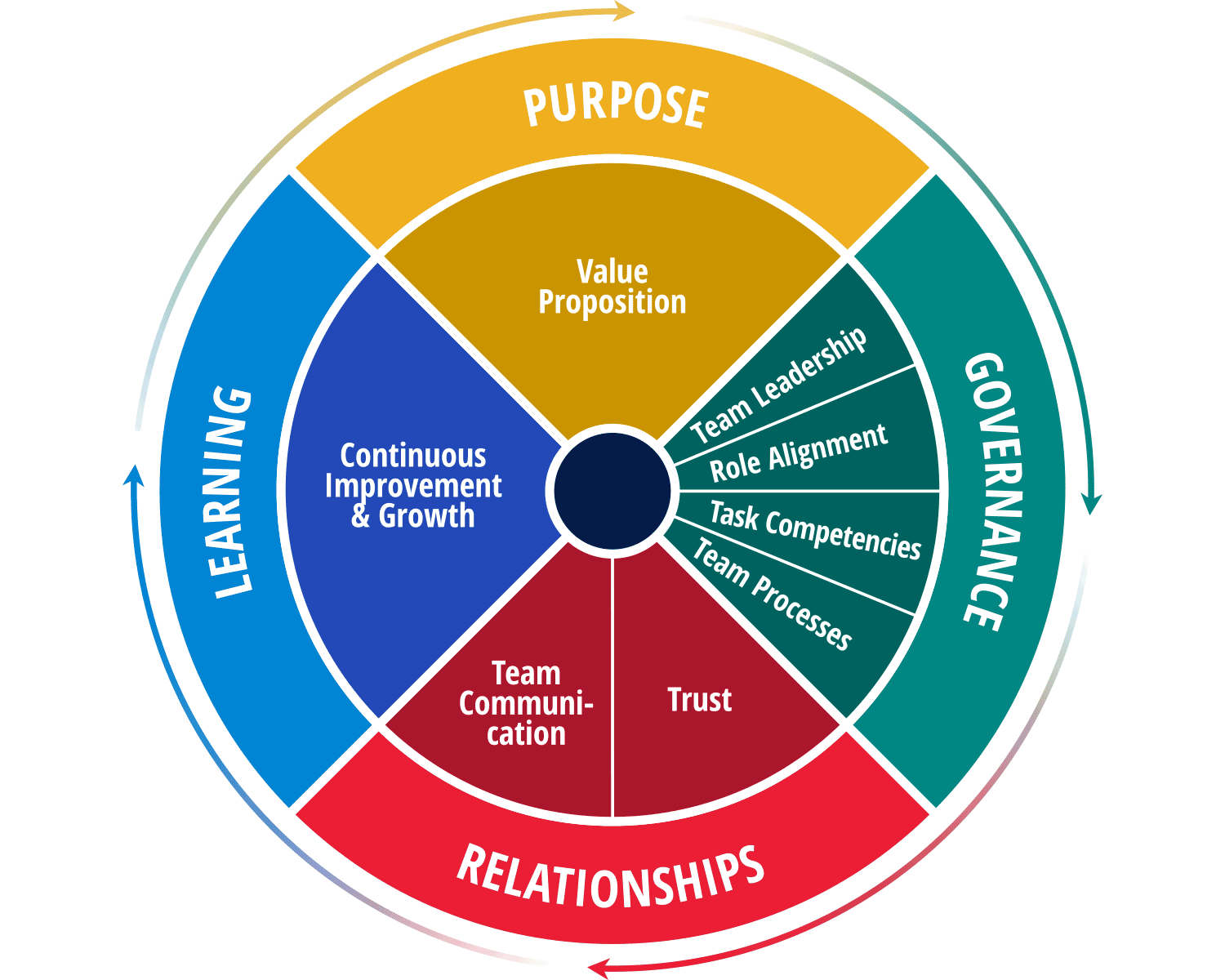Improving Team Performance to Drive Business & Stakeholder Results
Key Takeaways:
- Teams are vital to the success of organizations.
- Results-Based Teams are built on the foundation of purpose, governance, relationships, and learning.
- When teams build capabilitis around 8 key characteristics, they can achieve extraordinary results.

Improving Team Performance to Drive Business & Stakeholder Results

Today’s customers have high expectations from the organizations they interact with. Needs and wants need to be perceived and products available before the customer even realizes they’re interested in a specific product. Once a product is ready to take to market, there are a myriad of other in-house responsibilities before the item gets into the consumer’s hands. In order to keep up with the complex demands of customers and other stakeholders, organizations cannot rely alone on the skills of individuals. However, teams made of individuals with diversified talents unified by a common purpose are able to meet and even surprise and delight customers, investors, and often themselves.
Pick up any item and try to count the number of people involved in taking a product from concept to your grasp. Books, lightbulbs, spacecraft, television shows, events…almost every physical item is the result of teamwork. Whether creating a spacecraft, planning an event, or running an oil rig, team members must focus on contributing their individual part while also keeping a pulse on the overall well-being of the team.
The best teams don’t just happen, they require time, effort, and alignment. Investment in team alignment increases a team’s method of delivering extraordinary results consistently by improving their strategy, confidence and engagement. Team members who train together are clear about their roles, focused on targeted outcomes, and collaborate to achieve that outcome. Their ability to learn and adapt increases and they become more effective.
Myths about teamwork
In our work with teams, we often encounter leaders and individuals who have beliefs about teams and how and when to use them that we believe are myths. The following myths get in the way of building successful teams.
Myth #1: Teamwork solves every problem and works for every situation.
Teams are needed when you need to achieve extraordinary results. Good teams discern when it’s time to work together and when space is needed for individuals to execute within their respective areas of expertise.
Team members must understand their technical roles, social roles and consistently do their jobs. In football practice, there is no reason for the center to practice kicking field goals. Nor should the receivers step in for an offensive lineman. While each team member is focused on winning, the whole team is depending on each individual for their specialized skills.
Myth #2: Agreeing with each other is a vital part of teamwork.
Teams provide better solutions when staffed with diverse talents and opinions. Disagreements, questions, and essentially testing ideas to failure is how problems get identified and solved. The trick is to do all of those things with respect and recognition of one another’s value on the team. Further, once a decision is made, it is vital that everyone provides support by contributing to the best of their ability whether their ideas were the final decision or not.
Myth #3: Teams who have the best raw talent win.
Individuals get work done, but it is teams who win in complex business markets. RBL research shows that teams have FOUR TIMES the impact of individuals. When people work together well, they achieve results greater than the sum of their parts. This is evident in team sports often. The team who wins the World Cup is rarely the team who made the most goals throughout the season. World Cup championships are won by teams who work together offensively and defensively.
Improving team performance to deliver results that matter to stakeholders—inside and outside the organization.
We are The Results-Based Leadership (RBL) Group. We believe that leaders and their organizations should be focused on achieving results that matter to stakeholders. Our Results-based teams approach integrates 30 years of experience and research to help leadership teams, virtual teams, project teams, or cross-functional teams to maximize their impact through measurable results.
To achieve results, effective teams pay attention to key characteristics so that they are able to deliver results that matter to internal and external stakeholders.

Results-based teams achieve extraordinary results because of the quality of the characteristics they demonstrate. A team demonstrates certain characteristics so that they can achieve the desired results. As this cycle (pictured above) repeats itself, the team is able to exponentially improve and build upon its characteristics and capabilities which, in turn, raises the impact on team results.
Improving team performance with characteristics that help deliver results
We recognize that great teams take time, there will be setbacks and failures. But great teams are fit to handle anything by paying attention to four key domains and eight essential team characteristics.

- Value Proposition: An aspirational and energizing purpose guides each step of results based teams toward success. The direction must be clear, challenging and compelling, consequential, and collective.
- Team Leadership: Having people with power to mobilize others and to set constraints—is and important ingredient in making participation work. The leadership should demonstrate behaviors and values so that members can work efficiently together.
- Role Alignment: Clear roles help teams function efficiently and effectively.
- Task Competencies: Results based teams have the right team members with the right technical competencies to execute the job. This means individuals need the right technical skills, the right social skills, and the right number of people.
- Team Processes: Established processes make sure things get done and there is appropriate governance. Clear administrative processes around the following areas are especially helpful: Decision-making, Accountability, Communication, and Conflict Management.
- Trust: Teams build trust through behaviors that demonstrate care, including: learning about other team members, paying attention to personal issues, listening to each other, apologizing when necessary, and building on each other’s strengths.
- Team Communication: Communication is difficult in any relationship, the key is to continue communicating even when it is uncomfortable until common ground can be found. Individual members must recognize that communication isn’t just with words, but also with actions and their behaviors.
- Continuous Improvement and Growth: Effective teams learn and improve individually and as a team. A few ways to assess, reflect and learn include: instituting formal learning processes, allowing experimentation and failure, seeking new knowledge, skills and approaches.
The commitment to these 8 team characteristics benefits the team by providing a shared purpose and the necessary tools to support that purpose. After teams sets a purpose, which will focus on the results their organization needs the team to deliver, the next step is to exercise trust and begin taking action. Beyond purpose and trust, the development of the other team characteristics will be prioritized by the characteristics that will have the most immediate and significant impact on the team’s ability to deliver the required results.
Improving team performance improves organizational performance.
Teams are valuable to organizations only if they deliver results to stakeholders that they care about. Results are best delivered by teams separate myths from facts, develop and practice the eight characteristics, and recognize their role within their organization. Organizations have complex demands placed on them from their stakeholders. Customers want great products and they want their needs to be anticipated. Investors want dividends. Results based teams recognize the role they play in delivering the desired results to stakeholders and they step into action. If your teams are misaligned, or struggling to deliver the results leaders and stakeholders desire, RBL has solutions that are proven to help teams become more reliable and consistent.
